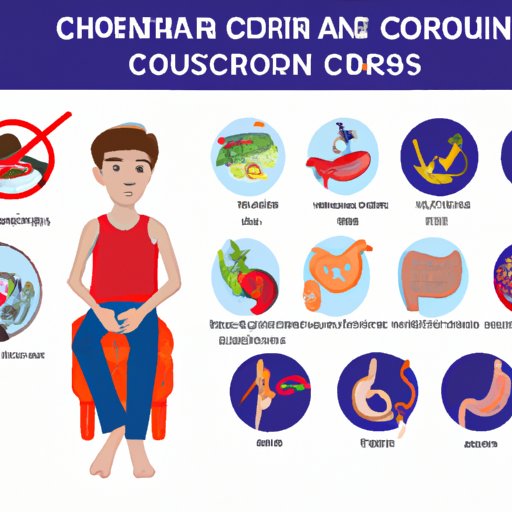Introduction
Crohn’s disease is an inflammatory bowel disease that affects millions of people worldwide, causing chronic inflammation in the digestive tract and often resulting in severe pain, diarrhea, and other disruptive symptoms. This article aims to provide a comprehensive overview of Crohn’s disease, including its definition, causes, symptoms, and treatment options. Additionally, we will be discussing how diet and lifestyle changes can help manage symptoms and improve quality of life for those living with Crohn’s disease.
A Comprehensive Guide to Understanding Crohn’s Disease
Crohn’s disease is a chronic inflammatory condition that can affect any part of the digestive tract, from the mouth to the anus. This condition causes inflammation of the digestive tract that can result in pain, diarrhea, weight loss, and other symptoms. Symptoms can range from mild to severe, and the disease may also lead to life-threatening complications such as bowel obstruction, fistulas, and abscesses.
Causes and Risk Factors
The causes of Crohn’s disease are still not fully understood, but research suggests it may be related to a combination of genetic, environmental, and immunological factors. Studies have shown that certain genes can make individuals more prone to developing the disease, but environmental factors such as diet, stress, and smoking also play a role. Women and people of Ashkenazi Jewish descent are more likely to develop Crohn’s disease.
How it Affects the Digestive System
Crohn’s disease can affect any part of the digestive tract, from the mouth to the anus. It can also affect the entire thickness of the intestinal wall. Inflammation can cause the gut to narrow and lead to blockages or cause ulcers on the surface of the digestive tract. Crohn’s disease can also result in malabsorption and malnutrition, leading to deficiencies in nutrients such as iron, calcium, and vitamin D.
Common Misconceptions
There are several misconceptions about Crohn’s disease, including that it only affects the digestive system, it is caused by stress, and it can be cured with diet alone. In reality, Crohn’s disease is a chronic condition that can lead to serious complications if left untreated. While stress can exacerbate symptoms, it is not a direct cause of the disease. Additionally, while dietary changes can help manage symptoms, it is not a cure for the disease.
Breaking Down the Symptoms and Treatment Options for Crohn’s Disease
List Common Symptoms of Crohn’s Disease
The symptoms of Crohn’s disease can vary widely depending on the severity and location of inflammation. The most common symptoms include abdominal pain, diarrhea, weight loss, fatigue, fever, and rectal bleeding. Other less common symptoms include joint pain, skin rashes, and eye inflammation.
The Different Types of Crohn’s Disease
The different types of Crohn’s disease are classified based on the location of inflammation within the digestive tract. These types include ileocolitis, ileitis, gastroduodenal Crohn’s disease, jejunoileitis, and Crohn’s colitis. Each type has different symptoms and requires a tailored treatment plan.
Treatment Options for Crohn’s Disease
Treatment for Crohn’s disease depends on the location and severity of inflammation. The most common treatment options include medication, surgery, and alternative therapies. Anti-inflammatory drugs, steroids, and immunosuppressants are often used to manage inflammation and symptoms. Biologic therapies target a specific component of the immune system that causes inflammation. Surgery may be necessary for complications such as strictures or abscesses. Additionally, alternative therapies such as probiotics, acupuncture, and hypnotherapy may also help to manage symptoms.
A Personal Experience with Crohn’s Disease: One Woman’s Journey to Diagnosis and Treatment
One woman’s diagnosis and treatment journey highlight both the challenges and successes of living with Crohn’s disease. After years of living with chronic digestive issues, she was finally diagnosed with Crohn’s disease. Her treatment included medication and dietary changes, which ultimately helped manage her symptoms and improve her quality of life. Through her experience, she offers advice to others experiencing similar symptoms and emphasizes the importance of a holistic approach to treatment.
How Diet and Lifestyle Changes Can Help Manage Crohn’s Disease
Diet and lifestyle changes can play a significant role in managing Crohn’s disease symptoms. While diet and exercise are not a cure for Crohn’s disease, they can help reduce inflammation and improve overall health. Specific dietary changes, such as avoiding trigger foods and consuming balanced, nutrient-dense meals, can help manage inflammation in the digestive tract. Exercise can also help manage stress and improve bowel function. Finally, prioritizing self-care and stress management can help manage symptoms and improve overall quality of life.
Crohn’s Disease in Children: What Parents Need to Know
Crohn’s disease can affect children and teens as well as adults. In children, Crohn’s disease can lead to growth delays and emotional distress, making early diagnosis and treatment crucial. The diagnosis and treatment of Crohn’s disease in children may differ from that of adults, requiring additional considerations such as psychotherapeutic and social support. Parents should work closely with healthcare providers to determine the best treatment plan for their child and prioritize self-care to support their own emotional wellbeing.
Conclusion
Crohn’s disease is a chronic condition that requires a holistic approach to treatment and management. Understanding the causes, symptoms, and treatment options for the disease can help those living with chronic inflammation manage their symptoms and improve their quality of life. By prioritizing self-care, maintaining effective communication with healthcare providers, and making lifestyle and dietary changes, those living with Crohn’s disease can manage their condition and live full, healthy lives.
